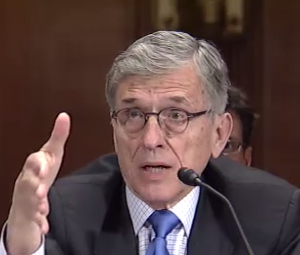The Federal Communications Commission voted Thursday to end the practice of providing small business subsidies to companies owned by larger providers like DISH Network, the satellite provider that secured billions in tax credits to buy airwaves during an FCC auction in January by bidding through two subsidiaries.
Chairman Wheeler’s proposal to change the rules passed along an increasingly familiar 3-2 partisan vote during the FCC’s July open meeting Thursday, with Democratic Commissioners Mignon Clyburn and Jessica Rosenworcel siding with Wheeler, and Republicans Ajit Pai and Michael O’Rielly dissenting.
“We all pay the price when corporate giants snag discounts that Congress never intended them to have,” Pai said during the meeting, “We were promised FCC action to close loopholes exploited by slick lawyers — instead, we have the FCC’s blessing of new loopholes through which even a minimally competent attorney could drive a truck.”
Included in those loopholes, Pai said, is a provision granting a 35 percent discount on spectrum to smaller providers, who can then turn around and lease 100 percent of it to larger carriers like AT&T, Verizon, Sprint, T-Mobile and others.
The rules jettison the requirement adopted by a previous commission that smaller providers use spectrum purchased with subsidies through their own facilities, prohibiting them from leasing all of it to larger providers.
“Today, an entrepreneur can’t compete with four big carriers owning 98 percent of the market — it’s an impossibility to put up a stick like we used to be able to do and start competing,” Wheeler said. “The statute says not one word about a requirement that there be facilities-based retail services.”
Wheeler released the rule changes late last month after the FCC was inundated with complaints from industry representatives, lawmakers, consumers and commissioners within its own ranks for allowing DISH to bid on spectrum through two smaller providers in which it owns a controlling interest.
DISH received $3.3 billion in small business subsidies, known as “designated entity” subsidies, by bidding through the shell companies, and walked away with 700 of the 1,600 spectrum licenses up for bidding, spending the third-most at auction behind AT&T and Verizon, despite currently offering no wireless broadband services.
RELATED: FCC Pressed to Deny $3.3 Billion in Small Business Tax Credits for DISH Network
As a result of Americans’ growing need for wireless spectrum to fuel bandwidth-heavy services like mobile video streaming, the FCC has begun reallocating airwaves from federal government entities and broadcasters to relicense and sell it to wireless providers. Designated entity tax subsidies are available to smaller providers looking to expand their networks and increase marketplace competition.
Joint-bidding agreements like the one used by DISH will be banned under the new rules, as will multiple applications from companies with the same controlling interest and with a shared strategy to purchase spectrum.
Only small businesses will be allowed to form consortiums, receive business credits and bid as a single joint entity. The updated rules also add a 15-percent bidding credit for rural carriers with 250,000 subscribers or fewer, and place a cap on credits.
Votes on additional bidding procedures for next year’s incentive auction, which will include spectrum reallocated from broadcasters across the country, were postponed by Wheeler Wednesday.
Included in Wheeler’s proposal is a plan to place TV stations in the “duplex gap” — the airwaves that separate mobile data uploads and downloads. Wireless carriers and broadcasters who favor opening up more spectrum for unlicensed use worry the move could cause interference problems.
Clyburn and Rosenworcel, both proponents of expanding unlicensed spectrum, share those concerns, prompting Wheeler to delay the vote.
The chairman was given a further excuse to delay Tuesday in form of a letter from House Energy and Commerce Committee Chairman Fred Upton and Communications and Technology Subcommittee Chairman Greg Walden, asking Wheeler to delay the vote, and criticizing the chairman for releasing information about the proposal last Friday — less than a week before the vote.
“Like a broken record, we have heard the FCC leadership pledge repeatedly to improve process while continuing to find new ways to keep the public in the dark,” the lawmakers wrote.
Wheeler also delayed the vote on a petition by T-Mobile, DISH, and others to expand the reserve of low-band spectrum set aside for bidding exclusively by smaller carriers from 30 to 40 MHz — spectrum AT&T and Verizon, the nation’s largest carriers, are forbidden from bidding on. The request has recently taken center stage in a public debate between industry rebel CEO John Legere of T-Mobile and AT&T.
RELATED: FCC Releases Airwave Auction Rules Amid AT&T, T-Mobile Fight
An FCC official told reporters during a conference call last month Wheeler opposed the request.
“The recommendation from the chairman is to keep the reserve where it is — in other words, to deny T-Mobile’s request to increase the reserve,” the official said. “The chairman has spoken about how the incentive auction and the mobile spectrum holdings was a balancing of factors, and he continues to believe it’s a very well-balanced approach.”
“The reserve is a big gain for competitive carriers, and 30 MHz is a big step forward for competition.”
The FCC will vote on the delayed proposals during its open meeting in August.

